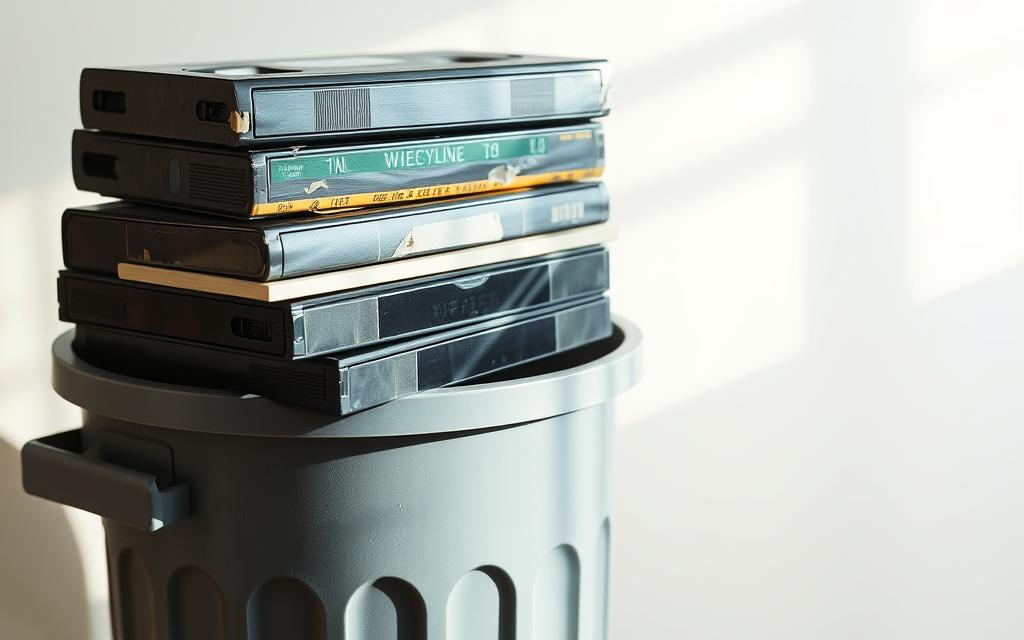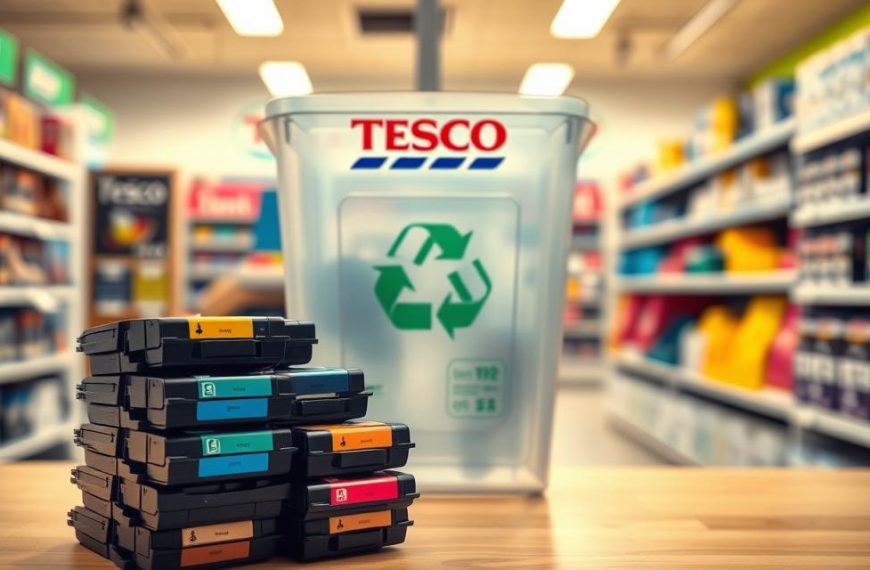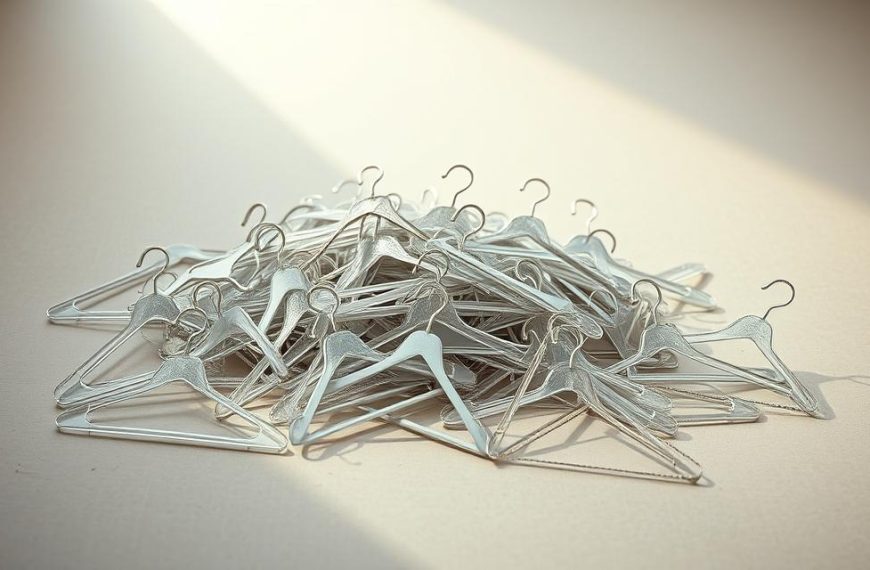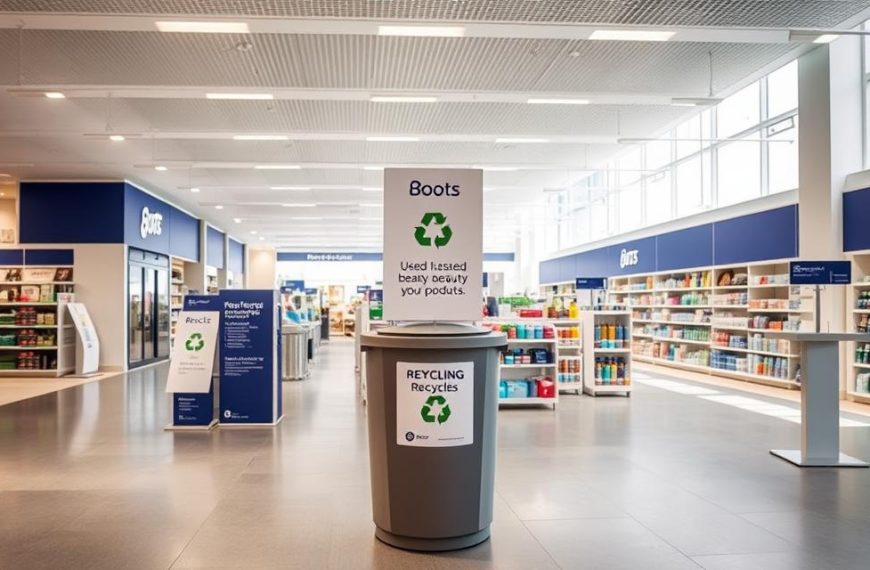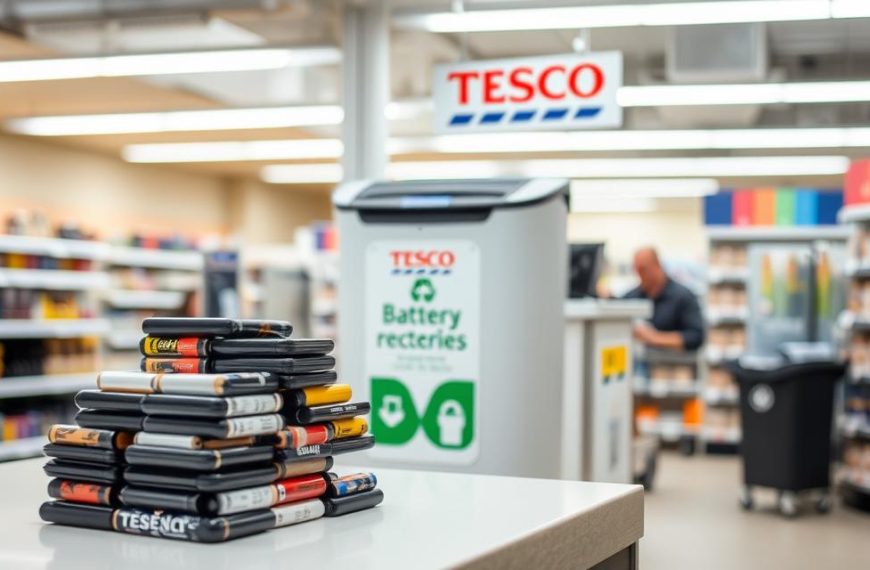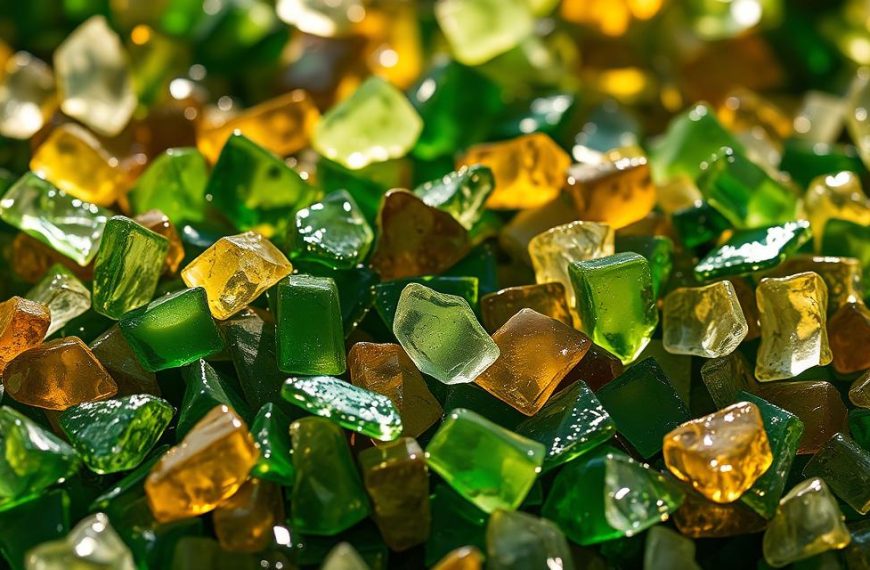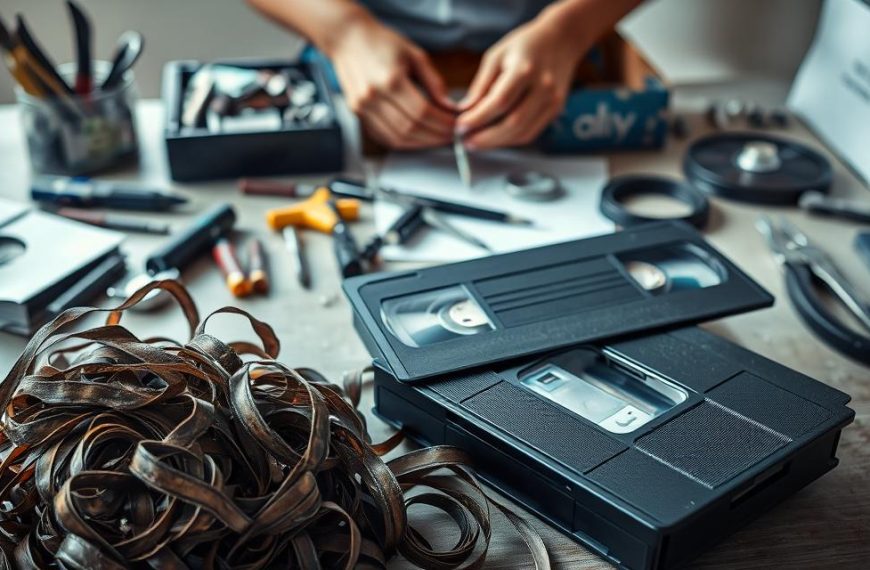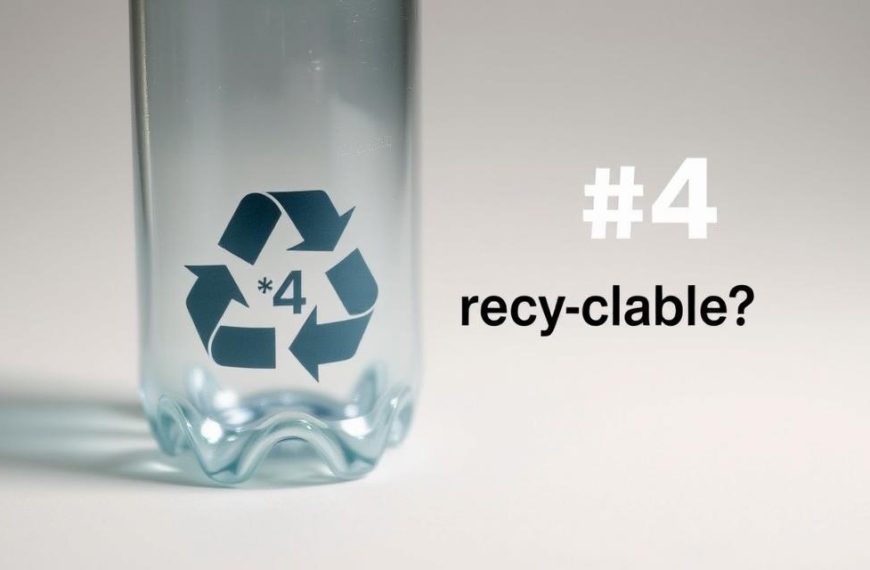Many people wonder what to do with their old VHS tapes. Proper disposal is essential to avoid environmental harm. Staples offers an e-waste recycling program, but policies can vary by location.
Before dropping off your tapes, it’s best to call your local store. Some locations may charge fees for certain items, like CRT monitors or TVs. Confirming beforehand ensures a smooth process.
Improper disposal of these items can release harmful toxins into landfills. Recycling them responsibly helps protect the environment. If Staples isn’t an option, consider mail-in programs or creative reuse ideas.
For secure recycling, services like GreenCitizen use dual-layer data destruction. This ensures your old tapes are handled safely and responsibly. Always explore all options to make an eco-friendly choice.
Introduction to VHS Tape Recycling
Over 10 billion VHS tapes were produced globally, and many still exist today. These relics of the past are a testament to the cultural shift from physical media to streaming and DVDs. While they hold nostalgic value, their disposal poses a significant environmental challenge.
VHS tapes are made of materials like #5 plastic and Mylar, which are difficult to break down. The PVC in these tapes is non-biodegradable, and when discarded improperly, it can release harmful methane emissions in landfills. This makes responsible disposal crucial for protecting the environment.
With an estimated 10 billion tapes still in existence, the urgency to address this issue grows. Recycling these items is not straightforward due to their complex components. This has led to their classification as e-waste, a category of waste that is becoming increasingly significant in today’s digital age.
As we move further away from the era of VHS, finding sustainable solutions for these tapes is essential. Whether through recycling programs or creative reuse, addressing this challenge helps reduce environmental harm and preserves resources for future generations.
What Are VHS Tapes Made Of?
Understanding the materials in old media helps in proper disposal. These items are composed of multiple layers, each posing unique challenges for recycling. Breaking down their components reveals why they are difficult to process.
Plastic Components
The outer casing is made of #5 polypropylene, a durable plastic. The tape itself consists of #1 PET, coated with chromium or iron oxide. While PET is recyclable, the combination of materials complicates the process.
Metal screws and adhesives further hinder recycling efforts. These mixed materials require specialized separation techniques, which are not always available. This makes these items less likely to be accepted by standard recycling programs.
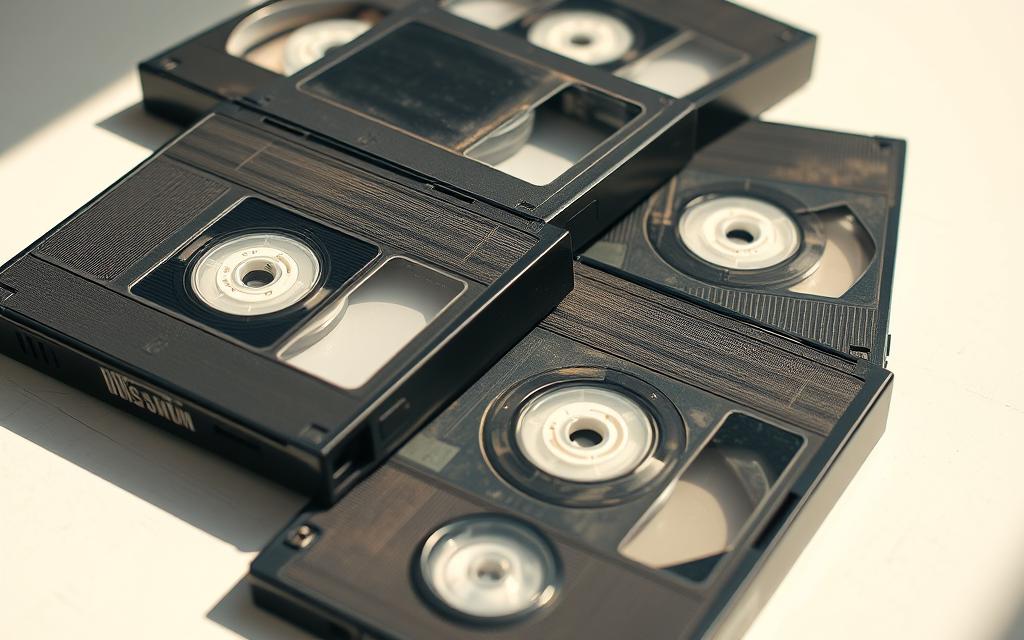
Magnetic Tape and Hazardous Materials
The magnetic tape contains chromium, a toxic metal that poses environmental risks. When improperly disposed of, it can release harmful substances into the soil and water. This makes responsible handling essential.
Comparing these tapes to computer data tapes highlights their complexity. Both contain similar materials, but the latter are often processed through specialized e-waste programs. As Mickey Friedman, COO of GreenDisk, notes,
“The mixed materials in these items make recycling a significant challenge.”
For more details on recycling these materials, visit this guide.
Does Staples Recycle VHS Tapes?
Proper disposal of outdated media is essential for environmental sustainability. Many households still have old items that require responsible handling. Staples offers an electronics recycling program, but policies can vary by location.
Staples’ Recycling Policies
Staples’ program accepts a range of e-waste, including VHS tapes. However, cassettes are excluded from their program. It’s important to note that not all locations may accept VHS tapes, so calling ahead is recommended.
Regional variations exist, with some areas like the Bay Area having stricter guidelines. Fees may apply for certain items, such as CRT monitors or TVs. Confirming details with your local store ensures a smooth process.
How to Drop Off VHS Tapes at Staples
Follow these steps to drop off your items responsibly:
- Use the Staples store locator to find the nearest location.
- Call ahead to confirm they accept VHS tapes.
- Bring your items to the customer service desk for processing.
For a detailed comparison, here’s how Staples stacks up against Best Buy’s recycling program:
| Program | Accepts VHS Tapes | Fees | Regional Variations |
|---|---|---|---|
| Staples | Yes | Possible | Yes |
| Best Buy | Yes | Possible | No |
If Staples isn’t an option, consider alternatives like GreenCitizen’s GTAMS tracking system. This ensures your items are handled securely and responsibly. For more details, visit this guide.
Other Recycling Options for VHS Tapes
Finding sustainable solutions for outdated media is more important than ever. While some stores may not accept certain items, there are alternative ways to ensure they are handled responsibly. Local e-waste recycling centers and mail-in programs offer convenient options for those looking to dispose of old media properly.
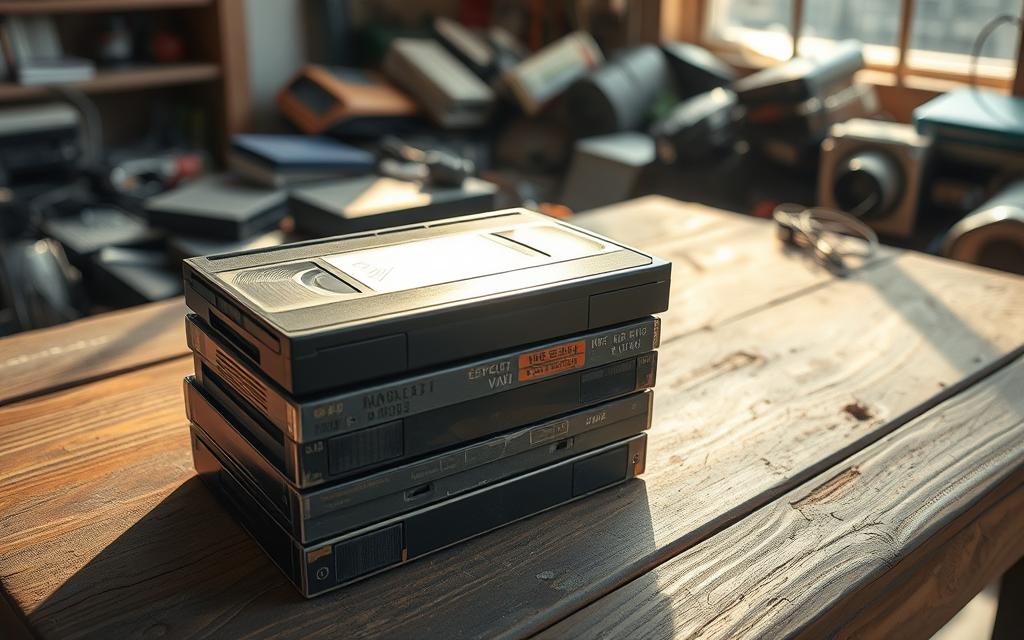
Local E-Waste Recycling Centers
Many communities have dedicated facilities that accept e-waste, including outdated media. These centers are equipped to handle complex materials safely. Earth911’s recycling locator tool makes it easy to find the nearest facility. Simply enter your ZIP code to search for nearby options.
Municipal events and corporate partnerships, like those with Call2Recycle, also provide opportunities for responsible disposal. These events often accept a wide range of items, making them a convenient choice for households.
Mail-In Recycling Programs
For those without access to local centers, mail-in programs are an excellent alternative. GreenDisk offers a Technotrash Can program with prepaid shipping. They charge $20 per unit for secure destruction, ensuring your items are processed responsibly.
GreenCitizen and Earth911 also provide reliable mail-in services. These programs are ideal for individuals who prefer the convenience of shipping their old media directly to recycling facilities.
“Mail-in programs are a practical solution for those in areas without local e-waste centers,” says a GreenDisk representative.
Reworld’s waste-to-energy incineration process is another innovative option. This method converts non-recyclable materials into energy, reducing landfill waste and supporting sustainability efforts.
Donating VHS Tapes for Reuse
Donating old media can give it a second life while supporting creative projects. Instead of discarding these items, consider giving them to organizations or individuals who can repurpose them. This approach not only reduces waste but also contributes to cultural preservation and artistic endeavors.
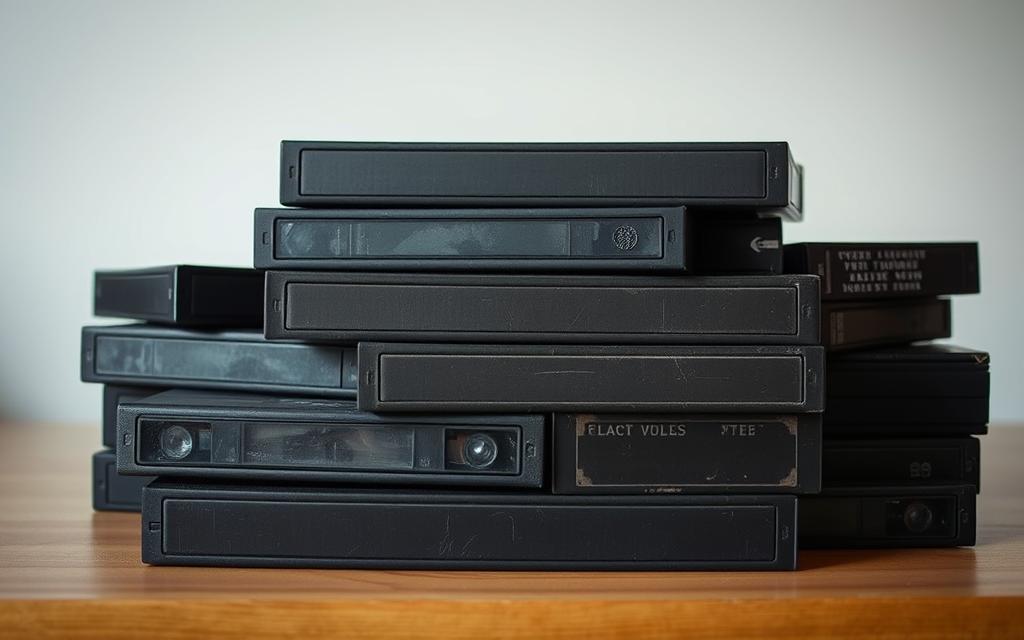
Thrift Stores and Libraries
Thrift stores and libraries are common destinations for donating cassette tapes. While demand for these items has declined, some retro enthusiasts still seek them out. Libraries may accept rare or culturally significant tapes for archival purposes.
However, it’s important to note that not all thrift stores will take these products. Declining demand means many locations may no longer accept them. Always call ahead to confirm their policies before dropping off your donation.
Artists and Creative Reuse Centers
Creative reuse centers, like Austin Creative Reuse and Scrap Exchange, are excellent options for donating old media. These organizations provide materials to artists and educators for innovative projects. Your donation could inspire tape-based sculptures, lamps, or other unique creations.
Artists often collaborate with these centers to find materials for their work. As one artist noted,
“Old media like cassette tapes offer a nostalgic element that resonates with audiences.”
For those with home videos, digitization services like Legacybox and Southtree can preserve memories while repurposing the physical tapes. This ensures your content is saved before the tapes are donated or reused.
Finally, niche markets like eBay or Etsy cater to retro enthusiasts who may pay money for rare or vintage items. This can be a rewarding way to find a new home for your old media while supporting a passionate community.
Creative Ways to Upcycle VHS Tapes
Transforming outdated media into something new sparks creativity and reduces waste. From functional storage to eye-catching decor, these projects give old items purpose. Upcycling VHS tapes not only preserves memories but also supports sustainability.

DIY Projects for Everyday Use
Turn old products into coasters by wrapping tape strips around cork bases. For jewelry, cut the magnetic ribbon into geometric shapes and seal with resin. RecycleCindy’s MyRecycledBags.com showcases purses woven from cassette tape.
YouTube tutorials demonstrate how to craft lamps using the plastic casing. The translucent shells diffuse light beautifully. Empty cases work well for organizing small items like guitar picks or screws.
Art and Decor Ideas
Artists use tapes to create mosaics or wall hangings. The glossy surface adds texture to mixed-media pieces. Over time, these items gain value among collectors.
Rare cassettes sell for high prices on eBay—some fetch up to $9,000. Stores like FYE and Half Price Books buy vintage media. Check their guidelines before selling.
| Project | Difficulty | Materials Needed |
|---|---|---|
| Coasters | Easy | Tape strips, cork, glue |
| Cassette Lamp | Moderate | Casing, LED bulb, tools |
| Resin Jewelry | Advanced | Tape, resin mold, sealant |
“Upcycling transforms waste into wonder. Each project tells a story.”
Conclusion
Responsibly managing outdated media is a critical step toward environmental sustainability. Avoiding landfills is essential, as improper disposal can release harmful methane emissions. Combining digitization with responsible recycling ensures memories are preserved while reducing waste.
Programs like GreenCitizen offer secure solutions for handling complex materials. Their EcoCenter locator makes it easy to find nearby facilities. By choosing these alternatives, you contribute to reducing CO2 emissions and supporting a greener future.
Take action today by exploring GreenCitizen’s EcoCenter locator. This simple step ensures your old media is processed in an eco-friendly way, protecting the planet for generations to come.
